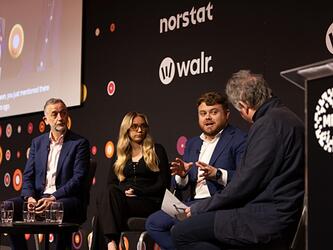Interview: CNN’s Mark Thompson & behavioural scientist Crawford Hollingworth on the misinformation challenge

AI-generated content, the decline of fact-checkers on social media and the rise of populism have combined to create an environment that makes it easier than ever for false information to pollute the information landscape.
Misinformation and disinformation are the top short-term risks for businesses and societies in the next two years, according to the World Economic Forum’s Global Risks Report for 2025. The issue is exacerbated by generative AI, as false or misleading content can be automated and distributed at scale.
At next week’s MRS annual conference, a keynote panel will address this issue from the perspective of what the insight sector can learn from the journalism profession in addressing misinformation and disinformation.
Ahead of the conference, Research Live spoke with Mark Thompson, chief executive and chair at CNN, and Crawford Hollingworth, founder of The Behavioural Architects, to discuss the issue and its potential impact on the research industry.
False information in 2025
While fake news is far from a recent phenomenon, it feels particularly topical. Mark Thompson said: “There’s no question that this moment in history – and particularly with things like the acquisition of Twitter, now X, by Elon Musk, a personal proponent and creator of fake news himself – those kinds of developments have made it feel very central.
“The extent to which the myth about the stolen election in 2020 has been accepted by a large slice of American society and the fact that Donald Trump, despite promoting that myth, won not just the electoral college but the popular vote in the 2024 election, gave a sense that there’s a kind of impunity [in] having very explicitly spread false information.
“Many politicians say things that aren’t true in different ways – it’s not universal, but the complete black/white, saying the opposite of what’s true and trying to reframe that, possibly believing it’s true, that does feel like it’s become part of the landscape now.
“Our job I think is mainly trying to make sure that we’re putting enough genuinely truthful reporting out there. I don’t think we want to occupy ourselves entirely with fact-checking – the single most important thing we can do is find out what’s really going on.”
The pressing issue for the research industry
What’s the role of researchers in this landscape? Hollingworth felt that the sector doesn't focus enough attention on the growth of misinformation and disinformation and where it may pervade research. “We may well give insights or data which has fundamental misinformation driving it, which we don’t flag enough, and that can be very dangerous and detrimental for businesses making decisions,” said Hollingworth, who is chairing next week’s panel discussion on the topic with Donie O’Sullivan, senior correspondent at CNN Worldwide, Hebe Campbell, video journalist and presenter at The Independent, and Chris Morris, chief executive of Full Fact.
Hollingworth discussed the position of market research at the forefront of information, potentially having the ability to spot misinformation or disinformation early.
“We’re at the front end of information and data and we may see little fires that we don’t think are important, but a tiny fire could become a massive blaze very quickly, and maybe our job is also to be a kind of early warning system of the little things we’re seeing that people might want to think about how to tackle, or not.”
Hollingworth said he would like to see a workstream to take place in the industry so that “for every piece of research going forward, there is a level of checks or disclosures about what we know or don’t know in the information we provide”.
Discussing what he’d say to researchers, Thompson said: “I’d say to the people gathering for your conference – ‘you guys should be experts. You should be telling us why it works, rather than getting journalists and media experts why it works'. A lot of it is in your wheelhouse in terms of the tactics and the way it works – and the skilful tactics around morality, and the way fake news is spread and echoed.”
The demand for fake news
Thompson discussed the importance of understanding the appeal of false information, saying: “Something we don’t talk enough about is the demand cycle on fake news. There are all sorts of interesting reasons that people might seek out and want to believe fake news. If what you’re told is happening causes a kind of cognitive dissonance with your own lived experience, where you feel hard done by or victimised and you’re being told the statistics show you’re actually much better off than other groups in society, you’ll reject the statistics and you’d rather listen to a politician who tells you things that intuitively fit your own narrative about your own life.
“It’s a kind of elite liberal mistake, I think, to portray the public as sheep who are entirely innocent victims of this. I think you’ve got rather willing victims who have become rather good at seeking it out and enjoying it, and a lot of fake news is quasi-satirical and there’s a lot of humour to be had from fake news... If you think about it as a form of kind of creative marketing, which is trying to play on people’s own emotional needs, you can see why it might be quite catchy.”
Mechanised misinformation
With generative AI’s ability to quickly generate content in the style of a particular publication, media companies like CNN are employing tools to verify provenance of media and establish whether a piece of video is genuine, for example.
In the end, said Thompson, it comes down to “journalistic experience and judgement – having really able journalists, and giving them the time to confirm things”.
Thompson added: “One of the challenges of journalism as a whole is that the economics of journalism have got tougher over time and relatively few news organisations have got the capabilities that we can afford to do that – particularly in digital media, where you have relatively small teams of relatively inexperienced journalists trying produce very high volumes of media, because they need to, and for whom cutting corners and moving quickly is understandable. One of the reasons why it’s important to find sustainable business models for journalism is because journalism is a craft which requires time and effort to get right and that’s not always in supply.”
He argued that while human cultures have always had “this kind of noisy marketplace, full of rumours and straightforward lies”, digital media has mechanised that and made it “more ambient and ubiquitous”.
He added: “I’m more concerned in some ways [about] how we make sure that people can, if they want to, find accurate information, and that there’s enough plurality of supply of accurate information so that ecosystem is there for people who want it, even if some fraction of the population are always going to choose something which suits them better – because it makes them feel better, or amuses them, or annoys somebody else.”
- For more information on the MRS annual conference, visit www.mrsannualconference.com

We hope you enjoyed this article.
Research Live is published by MRS.
The Market Research Society (MRS) exists to promote and protect the research sector, showcasing how research delivers impact for businesses and government.
Members of MRS enjoy many benefits including tailoured policy guidance, discounts on training and conferences, and access to member-only content.
For example, there's an archive of winning case studies from over a decade of MRS Awards.
Find out more about the benefits of joining MRS here.














0 Comments